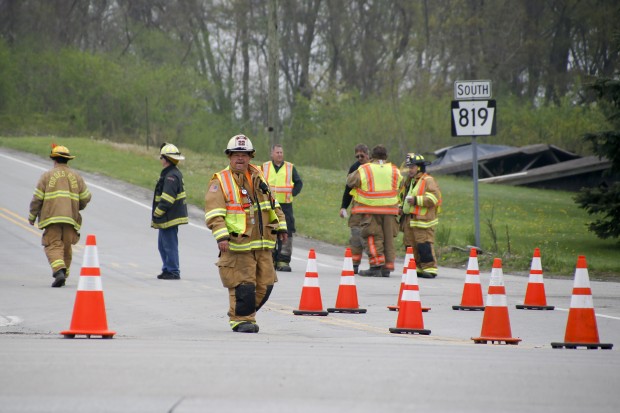New pipeline rule requires quicker reporting of accidents
-
Jon Hurdle

Keith Srakocic / AP Photo
First responders block the access to the area where a natural gas explosion at a pipeline burned one person and damaged houses on April 29, 2016, in Salem Township, Pa. The explosion caused flames to shoot above nearby treetops in the largely rural area, about 30 miles east of Pittsburgh, and prompted authorities to evacuate businesses nearby.
Federal pipeline regulators are requiring operators to report accidents more quickly, and they are tightening rules on conducting drug and alcohol tests after an accident.
The Pipeline and Hazardous Materials Safety Administration is also setting up a new procedure for recovering its costs for reviewing the design of some new pipelines, and is requiring operators to report any change of product or direction of flow in their pipelines.
In an announcement last week about a final rule that was due to be published in the Federal Register on Jan. 23, the agency said it was tightening its accident-reporting requirements in order to increase the safety of pipeline construction and operation.
“PHMSA expects that quicker accident and incident reporting will lead to a safety benefit to the public, the environment, and limit property damage,” the agency said in a regulation that implements the Pipeline Safety, Regulatory Certainty and Job Creation Act of 2011.
The rule, which becomes effective 60 days after publication, will require operators to report accidents to PHMSA within an hour, and to report confirmation of the incident within 48 hours.
Energy companies are expected to build as many as 30,000 miles of pipeline in Pennsylvania over the next 20 years to pump abundant natural gas from the Marcellus and Utica Shales to market, the Department of Environmental Protection has said. Most of the new pipeline mileage will be gathering lines, which connect wellheads to major transmission lines.
The new rule also sets up a structure to allow the agency to recover its costs for reviewing the design of pipelines that cost $2.5 billion or more, or that contain new technologies.
Operators will have to inform the agency if they change the product going through a pipeline, such as a shift from crude oil to highly volatile liquids, or if they reverse the flow for more than 30 days.
They will be required to keep for at least three years their reasons why drug and alcohol tests were not conducted after an accident.
The agency said the rule changes are designed to protect people and property while changing “unduly burdensome or nonsensical requirements.”
But the Pennsylvania-based Pipeline Safety Coalition said the new rule doesn’t do enough to protect public safety in light of the fact that more than two-thirds of pipeline failures are the result of operator deficiencies.
PHMSA data show the average number of pipeline incidents were almost two per day in 2015 – the second highest for 20 years – while the number averaged about 1.7 per day in 2016.
The coalition ridiculed the agency’s stated goal of scrapping burdensome regulation, saying it should focus entirely on safety.
“To us, nearly two incidents per day does not beget a safety culture that should be focusing on ‘unduly burdensome or nonsensical requirements,’” said Lynda Farrell, executive director of the coalition.
Since 67.3 percent of pipeline failures are within the control of operators, “perhaps the question is not if regulations are burdensome as much as it is on why operators allow this situation to persist,” Farrell wrote in a statement.
She also criticized as “disappointing” the agency’s decision to defer final action on operator qualifications (OQ).
“PSC will be following this delay closely as we believe, given the stats above, OQ may well be the first step in elevating our levels of pipeline safety,” Farrell said.
She also urged PHMSA to adopt National Transportation Safety Board recommendations following major pipeline leaks or explosions in San Bruno, CA and Marshall, MI in recent years.
“We cannot state strongly enough that the recommendations made by NTSB are consistently valuable, life saving recommendations, for the most part, not implemented in a way the public deserves,” Farrell said.
But she welcomed PHMSA’s plan to require reporting of pipeline flow reversal, and that applications for permit renewals will be treated in the same way as initial applications.
The new rules follow regulations published on Jan. 13 tightening safety requirements for pipelines such as Sunoco Logistics’ proposed Mariner East 2 that would carry hazardous liquids across Pennsylvania.
The American Petroleum Institute, which said the earlier announcement would result in an overall loosening of safety standards, said only that it was reviewing the latest rule.
















